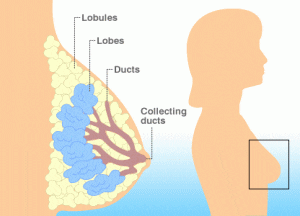 A new study conducted in Canada suggests that women who have been recently diagnosed with diabetes are more likely to also be diagnosed with breast cancer.
A new study conducted in Canada suggests that women who have been recently diagnosed with diabetes are more likely to also be diagnosed with breast cancer.
Research has previously linked breast cancer and diabetes. However, this new study also suggests that doctors may be discovering more cases of breast cancer in diabetics partly because they’re checking more, and not just because diabetes increases a woman’s risk of developing breast cancer. The findings of the study were published in the journal “Diabetes Care.”
Jeffrey Johnson of the University of Alberta in Edmonton was one of the researchers involved with the study. “The relationship that we see (between diabetes and cancer), we wondered if it was something about the fact that people with diabetes go to the doctor’s office more often,” said Johnson.
“When a new diagnosis of diabetes is made, people undergo a lot of tests and general health exams,” which often includes breast cancer screenings through mammograms.
Scientists have previously demonstrated in research that individuals who have been diagnosed with diabetes are also at an increased risk of several types of cancer, from colorectal and pancreatic cancer to breast cancer. Some hypothesized that certain risk factors, such as a sedentary lifestyle, poor diet, and smoking could be risk factors for both diabetes and cancer—explaining why the disease seem to accompany each other so often.
The metabolic changes that occur in diabetics, including blood sugar and insulin levels, could also provide a more favorable environment for the growth of tumors, said Johnson.
The study analyzed data from approximately 170,000 women living in British Columba, half of which had been recently diagnosed with Type 2 diabetes; the other half did not have the disease. The researchers tracked study participants for four to five years, and over that time period, about 2,400 of the women were diagnosed with breast cancer.
The chances of getting breast cancer were similar across the diabetes and non-diabetes groups. However, a deeper analysis revealed that age and time of diabetes diagnosis seemed to have an effect on breast cancer rates. Women who were older and post-menopausal with diabetes had a slightly higher chance of being diagnosed with breast cancer than women without diabetes.
Additionally, among women 55 and older, those who had been diagnosed with diabetes within the last three months were about 30 percent more likely to also be diagnosed with breast cancer than women without diabetes. Still, doctors couldn’t determine whether those results were due to random chance.
A few months after the researchers began following the participants—around the time when checkups and appointments would slow down following a diagnosis of diabetes—breast cancer diagnosis rates were the same among women with and without diabetes.
According to Johnson, the results don’t eliminate explanations such as common risk factors for the two diseases or increased chances of cancer due to hormonal changes.
“I think there are so many things going on in the relationship that this is maybe only one part of it,” said Johnson. “We’re really early on in understanding this relationship.”
According to Dr. Christos Mantzoros, an expert on with Harvard Medical School, the findings of the study might mean that the increased diagnoses of breast cancer in women with diabetes was due to the increased frequency of check-ups following diabetes. However, it could also mean that the risk factors common to both diseases could cause them to develop close to each other.
“Women with diabetes need to be more vigilant and their doctors need to be screening them for malignancies associated with diabetes including, but not limited to breast cancer,” said Mantzoros.